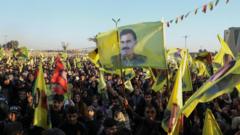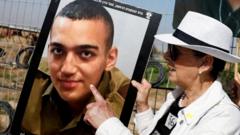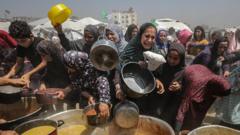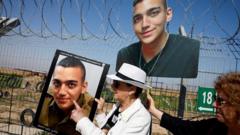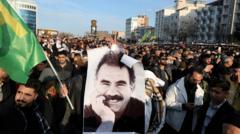"A BBC correspondent recounts the anguish of fleeing Gaza, highlighting the overwhelming feelings of guilt and heartache as they receive news of family affected by ongoing conflict. Many Gazans, now in exile, face economic hardships while trying to support relatives back home amid relentless warfare."
"Exile’s Pain: Gazans Struggle with Guilt and Loss as War Rages On"
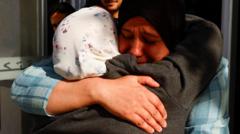
"Exile’s Pain: Gazans Struggle with Guilt and Loss as War Rages On"
"As conflict persists, families are torn apart, leaving those who fled grappling with guilt and despair over loved ones still in Gaza."
It's been 10 months since my family left Gaza, and the echoes of loss and sorrow continue to reverberate in our lives, compounded by the ongoing conflict's devastation. Just before the anniversary of the war’s onset, we endured the most harrowing eight hours we've faced since our departure. A video message from my wife's cousin in Gaza conveyed sheer terror: “The tanks are surrounding us and firing at us. These could be the last moments of our lives. Pray for us and do anything to save us.”
This news caused my wife to collapse from shock; her uncle, aunts, and their families - a total of 26 individuals - were under direct attack. With Israeli raids intensifying across Gaza, we endured moments of agonizing silence, fearing for their safety. Finally, a voice note informed us that four were injured, with my aunt Wafaa in critical condition. My frantic calls to the Red Cross and Palestinian Red Crescent proved futile at first. After an agonizing wait, they were eventually allowed to evacuate, but it was too late for Wafaa; she died en route to the hospital.
My father still resides in Gaza, living in a tent in Khan Younis, which faced recent bombardment. From Istanbul, where my wife and children now seek refuge, every phone call to him overwhelms me with guilt, knowing so many like us are scattered across Turkey, Egypt, and beyond, compelled to flee.
In Egypt alone, over 100,000 Gazans have sought shelter since November. Although they are not facing immediate danger, many struggle to provide basic needs for their families. At a lively café in Cairo’s Nasr City, newly arrived refugees gather, sharing stories and attempting to lessen their homesickness, clinging to hope for peace and a return to Gaza while grappling with anxiety.
Abu Anas Ayyad, a former businessman known as the “King of Gravel,” listens to a melodious Palestinian song that stirs memories of home. He mourns the loss of his ties back home, stating, “Every missile that hits a building in Gaza feels like a piece of my heart shattering.” His dismay is compounded by the Iran-backed Hamas group's actions that brought about this turmoil. “I will not return if Hamas remains in power,” he asserts, wanting more for his children than being caught in this cycle of violence.
Nearby, Mahmoud Al Khozondr, who ran a famous hummus and falafel shop prior to the war, shares how his life has been turned upside down. Once thriving, he now finds himself living in a cramped apartment, lamenting the loss of everything dear to him.
Support for remaining family members in Gaza is scarce as Gazans try to send money home, battling high fees and risk-laden transactions. Mahmoud Saqr, a former store owner, expresses anguish over the exploitation of their plight.
In Turkey, my family strives for a semblance of normalcy, but reminders of Gaza creep into our lives. My children’s lingering memories of friends and familiar places weigh heavily on our hearts. Since October 7, our lives have been at a standstill as we wrestle with the permanence of our separation, haunted by thoughts of those we’ve left behind while our bodies may have escaped, but our souls remain tethered to Gaza.


